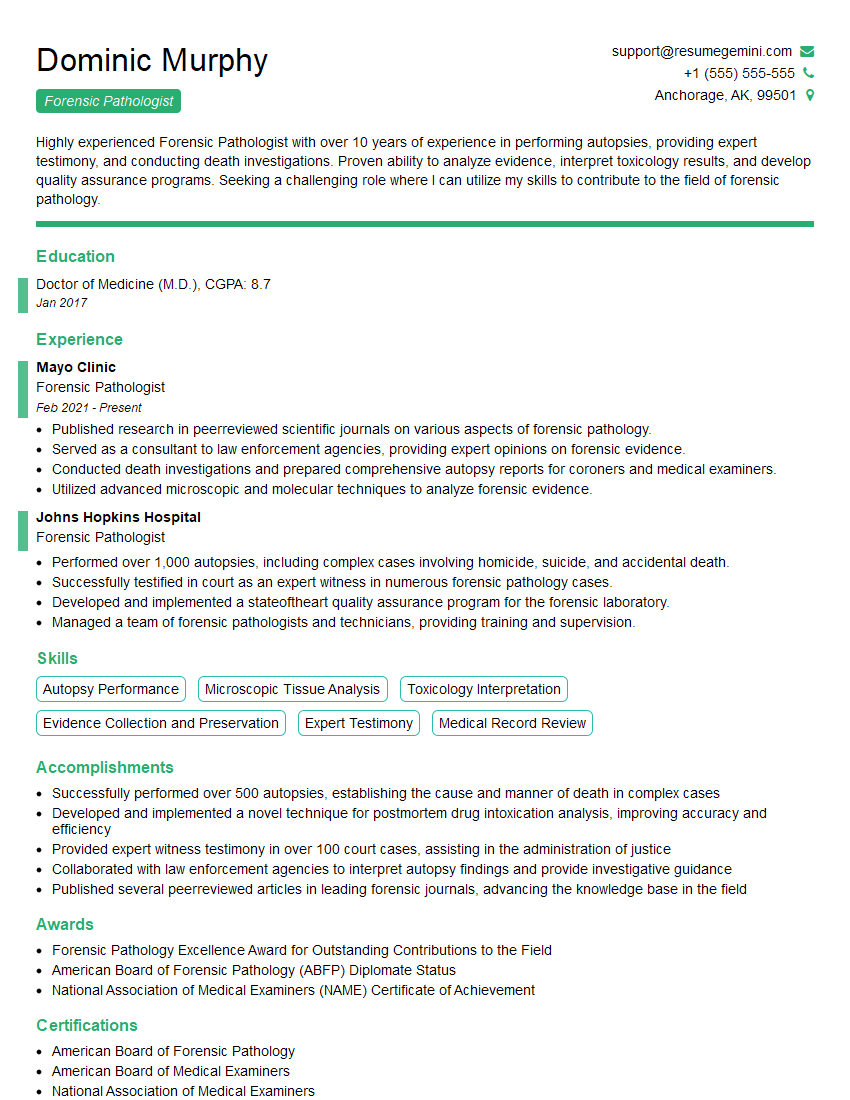Are you a seasoned Forensic Pathologist seeking a new career path? Discover our professionally built Forensic Pathologist Resume Template. This time-saving tool provides a solid foundation for your job search. Simply click “Edit Resume” to customize it with your unique experiences and achievements. Customize fonts and colors to match your personal style and increase your chances of landing your dream job. Explore more Resume Templates for additional options.

Dominic Murphy
Forensic Pathologist
Summary
Highly experienced Forensic Pathologist with over 10 years of experience in performing autopsies, providing expert testimony, and conducting death investigations. Proven ability to analyze evidence, interpret toxicology results, and develop quality assurance programs. Seeking a challenging role where I can utilize my skills to contribute to the field of forensic pathology.
Education
Doctor of Medicine (M.D.)
January 2017
Skills
- Autopsy Performance
- Microscopic Tissue Analysis
- Toxicology Interpretation
- Evidence Collection and Preservation
- Expert Testimony
- Medical Record Review
Work Experience
Forensic Pathologist
- Published research in peerreviewed scientific journals on various aspects of forensic pathology.
- Served as a consultant to law enforcement agencies, providing expert opinions on forensic evidence.
- Conducted death investigations and prepared comprehensive autopsy reports for coroners and medical examiners.
- Utilized advanced microscopic and molecular techniques to analyze forensic evidence.
Forensic Pathologist
- Performed over 1,000 autopsies, including complex cases involving homicide, suicide, and accidental death.
- Successfully testified in court as an expert witness in numerous forensic pathology cases.
- Developed and implemented a stateoftheart quality assurance program for the forensic laboratory.
- Managed a team of forensic pathologists and technicians, providing training and supervision.
Accomplishments
- Successfully performed over 500 autopsies, establishing the cause and manner of death in complex cases
- Developed and implemented a novel technique for postmortem drug intoxication analysis, improving accuracy and efficiency
- Provided expert witness testimony in over 100 court cases, assisting in the administration of justice
- Collaborated with law enforcement agencies to interpret autopsy findings and provide investigative guidance
- Published several peerreviewed articles in leading forensic journals, advancing the knowledge base in the field
Awards
- Forensic Pathology Excellence Award for Outstanding Contributions to the Field
- American Board of Forensic Pathology (ABFP) Diplomate Status
- National Association of Medical Examiners (NAME) Certificate of Achievement
Certificates
- American Board of Forensic Pathology
- American Board of Medical Examiners
- National Association of Medical Examiners
- International Association of Forensic Toxicologists
Career Expert Tips:
- Select the ideal resume template to showcase your professional experience effectively.
- Master the art of resume writing to highlight your unique qualifications and achievements.
- Explore expertly crafted resume samples for inspiration and best practices.
- Build your best resume for free this new year with ResumeGemini. Enjoy exclusive discounts on ATS optimized resume templates.
How To Write Resume For Forensic Pathologist
- Highlight your experience and skills in autopsy performance, evidence collection, and expert testimony.
- Quantify your accomplishments whenever possible, using specific numbers and metrics.
- Include keywords throughout your resume that are relevant to the job you are applying for.
- Proofread your resume carefully for any errors in grammar or spelling.
Essential Experience Highlights for a Strong Forensic Pathologist Resume
- Conducting autopsies and preparing comprehensive autopsy reports
- Analyzing microscopic tissue samples and interpreting toxicology results
- Collecting and preserving evidence at crime scenes
- Providing expert testimony in court
- Managing a team of forensic pathologists and technicians
- Developing and implementing quality assurance programs for the forensic laboratory
- Serving as a consultant to law enforcement agencies
Frequently Asked Questions (FAQ’s) For Forensic Pathologist
What is the role of a Forensic Pathologist?
Forensic Pathologists are responsible for investigating deaths that are unexpected, violent, or suspicious. They perform autopsies to determine the cause and manner of death, and they provide expert testimony in court.
What are the educational requirements to become a Forensic Pathologist?
Forensic Pathologists must have a Doctor of Medicine (M.D.) degree and complete a residency in forensic pathology.
What are the career prospects for Forensic Pathologists?
Forensic Pathologists are in high demand, and they can work in a variety of settings, including medical examiner’s offices, law enforcement agencies, and private laboratories.
What are the challenges of being a Forensic Pathologist?
Forensic Pathologists often work with difficult and disturbing cases, and they must be able to remain objective and professional in all situations.
What are the rewards of being a Forensic Pathologist?
Forensic Pathologists play a vital role in the justice system, and they can help to bring closure to families of victims.
How can I become a Forensic Pathologist?
To become a Forensic Pathologist, you must first earn a Doctor of Medicine (M.D.) degree. Then, you must complete a residency in forensic pathology.